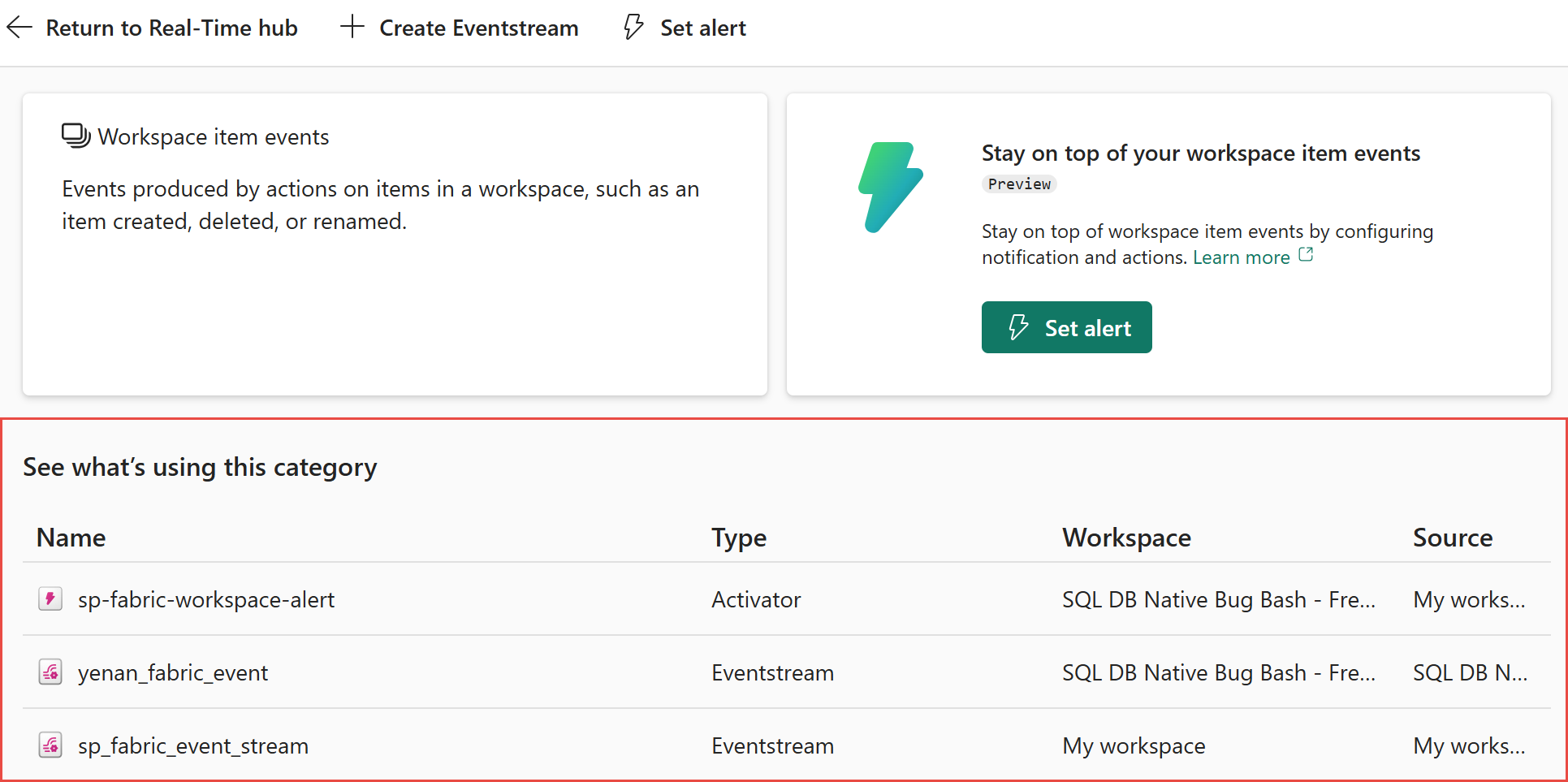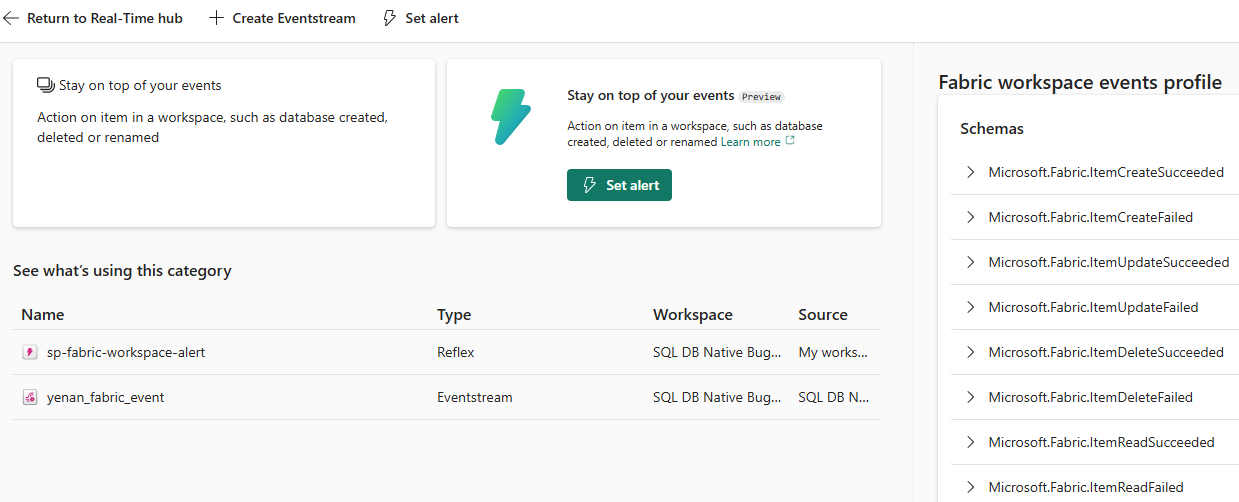Explore Fabric workspace item events in Fabric Real-Time hub (preview)
Fabric workspace item events allow you to receive notification when certain actions occur on your workspace items. For instance, when a new artifact is created or an existing artifact is deleted. These events can be used to alert on other actions or workflows in Fabric, such as running a data pipeline or sending an email notification using Fabric Activator alerting capabilities. This article explains how to explore Fabric workspace item events in Real-Time hub.
Note
Consuming Fabric and Azure events via eventstream or Fabric Activator isn't supported if the capacity region of the eventstream or Activator is in the following regions: West India, Israel Central, Korea Central, Qatar Central, Singapore, UAE Central, Spain Central, Brazil Southeast, Central US, South Central US, West US 2, West US 3.
View Fabric workspace item events detail page
In Real-Time hub, select Fabric events.
Select Fabric workspace item events from the list.

You should see the detail view for Fabric workspace item events.
Actions
At the top of the detail page, you see the following two actions.
Create eventstream - lets you create an eventstream based on events from the selected Fabric workspace item.
Set alert - lets you set an alert when an operation is done for a Fabric workspace item, such as a new artifact is created.

See what's using this category
This section shows the artifacts using Fabric workspace item events. Here are the columns and their descriptions shown in the list.
| Column | Description |
|---|---|
| Name | Name of the artifact that's using Fabric workspace item events. |
| Type | Artifact type – Activator or Eventstream |
| Workspace | Workspace where the artifact lives. |
| Source | Name of the workspace that is source of the events. |

Fabric workspace item events profile

Event types
| Event type name | Description |
|---|---|
| Microsoft.Fabric.ItemCreateSucceeded | This event is activated when a create operation on resource succeeds. For example, an event produced when a new artifact is created successfully. |
| Microsoft.Fabric.ItemCreateFailed | This event is activated when a create operation on resource fails. For example, an event produced when a new artifact failed during creation. |
| Microsoft.Fabric.ItemUpdateSucceeded | This event is activated when an update operation on resource succeeds. For example, an event produced when a dataflow is updated successfully. |
| Microsoft.Fabric.ItemUpdateFailed | This event is activated when an update operation on resource fails. For example, an event produced when a dataflow failed during the update. |
| Microsoft.Fabric.ItemDeleteSucceeded | This event is activated when a delete operation on resource succeeds. For example, an event produced when a dataflow is deleted successfully. |
| Microsoft.Fabric.ItemDeleteFailed | This event is activated when a delete operation on resource fails. For example, an event produced when a dataflow failed during deletion. |
| Microsoft.Fabric.ItemReadSucceeded | This event is activated when a read operation on resource succeeds. For example, an event produced when an artifact is read successfully. |
| Microsoft.Fabric.ItemReadFailed | This event is activated when a read operation on resource fails. For example, an event produced when an artifact failed during the read. |
Schemas
An event has the following top-level data:
| Property | Type | Description | Example |
|---|---|---|---|
source |
string | Identifies the context in which an event happened. | 00000000-0000-0000-0000-000000000000 |
subject |
string | Identifies the subject of the event in the context of the event producer. | /workspaces/00000000-0000-0000-0000-000000000000/items/00000000-0000-0000-0000-000000000000 |
type |
string | Contains a value describing the type of event related to the originating occurrence. | Microsoft.Fabric.ItemCreateSucceeded |
time |
timestamp | Timestamp of when the occurrence happened. | 2024-04-23T21:17:32.6029537+00:00 |
id |
string | Unique identifier for the event. | 00000000-0000-0000-0000-000000000000 |
specversion |
string | The version of the Cloud Event spec. | 1.0 |
dataschemaversion |
String | The version of the data schema. | 1.0 |
capacityId |
string | Unique identifier for the capacity. | 00000000-0000-0000-0000-000000000000 |
domainId |
string | Unique identifier for the domain. | 00000000-0000-0000-0000-000000000000 |
The data object has the following properties:
| Property | Type | Description | Example |
|---|---|---|---|
itemId |
guid | Unique identifier for the item/artifact. | 00000000-0000-0000-0000-000000000000 |
itemKind |
string | The kind of item/artifact. | Item type such as Notebook, Lakehouse, etc. See the next section for a list of item types not supported by workspace item events |
itemName |
string | The item/artifact name. | Test Notebook |
workspaceId |
guid | Unique identifier for the workspace. | 00000000-0000-0000-0000-000000000000 |
workspaceName |
string | The name of the workspace. | Test Workspace |
principalId |
guid | Unique identifier for the user. | 00000000-0000-0000-0000-000000000000 |
executingPrincipalType |
string | The kind of user. | User |
Note
Currently, Fabric workspace item events for the following Power BI item types (itemKind) are not supported:
- Semantic Model
- Paginated report
- Report
- App
- Dashboard
